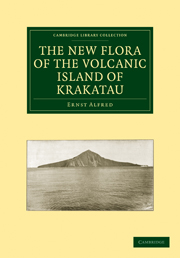Book contents
- Frontmatter
- PREFACE
- NOTE BY THE TRANSLATOR
- Contents
- PLATES
- INTRODUCTION
- I Results of the visits of 1886 and 1897
- II The Expedition of April 24—27, 1906, to the Sunda Strait region and to Krakatau
- III The present composition of the Flora of Krakatau
- IV Biological conditions on Krakatau
- V The relative importance of the different agents of plant-dispersal in the colonisation of the Krakatau Islands
- VI Succession of plant-associations and the future character of the vegetation of Krakatau
- BIBLIOGRAPHY
I - Results of the visits of 1886 and 1897
Published online by Cambridge University Press: 07 September 2010
- Frontmatter
- PREFACE
- NOTE BY THE TRANSLATOR
- Contents
- PLATES
- INTRODUCTION
- I Results of the visits of 1886 and 1897
- II The Expedition of April 24—27, 1906, to the Sunda Strait region and to Krakatau
- III The present composition of the Flora of Krakatau
- IV Biological conditions on Krakatau
- V The relative importance of the different agents of plant-dispersal in the colonisation of the Krakatau Islands
- VI Succession of plant-associations and the future character of the vegetation of Krakatau
- BIBLIOGRAPHY
Summary
Dr Melchior Trcub, the distinguished and genial Director of the Botanical Institute at Buitenzorg in Java, rendered a great service to Science by initiating the study of the new Krakatau flora and thus paving the way for further investigations. The botanical explorations, made on three difterent occasions, of the islands which were entirely depleted of vegetation in 1883 have not only furnished results of general biological interest, but by demonstrating the successive stages in colonisation, they also afford one of the most important contributions towards the solution of the much discussed problem as to the source and history of the introduction of a flora into an island far removed from the mainland. The older literature concerned with this interesting problem in plant-geography, so far as regards direct observation, deals with the history of colonisation of recently formed coral islands, that is of flat land surfaces, and with the investigation of the means of dispersal of plants from older coral reefs and volcanic islands. On Krakatau, Treub had an opportunity of studying the more complex problem: how a volcanic island, which has lost the whole of its flora as the result of an eruption, acquires a new vegetation; how, in other words, an island of considerable height suddenly emerging from the sea becomes stocked with plants; and further by what successive stages the new floral elements appear on the island and by what external agencies the colonisation is effected.
- Type
- Chapter
- Information
- The New Flora of the Volcanic Island of Krakatau , pp. 5 - 8Publisher: Cambridge University PressPrint publication year: 2009First published in: 1908



